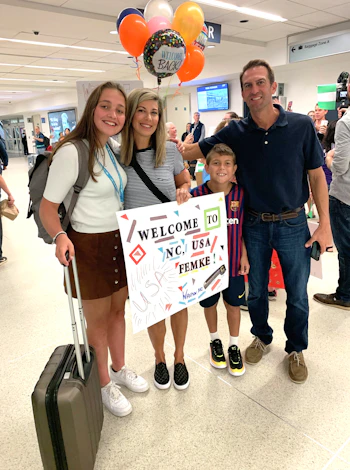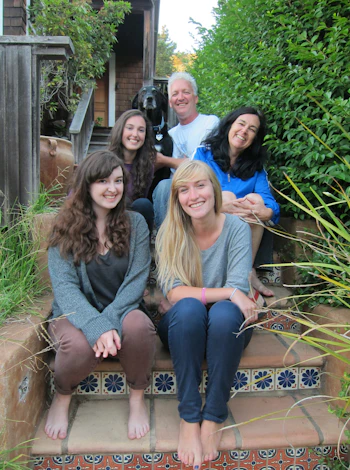High school exchange program
in the USA
Live the life of an American teenager on a semester or year exchange program in the USA.














Experience the American lifestyle
first-hand
Student exchange program in the States
The United States of America are one of the world’s most welcoming countries: the American people are friendly and love to share their culture and lifestyle with visitors. It is no coincidence that the US are the number one student exchange destination across the globe!
Join an American family, participate in iconic festivities and experience the famous American school spirit. Without even realising, you’ll start speaking like a local, make long-life friendships and immerse yourself in a different lifestyle – your own American dream becoming daily reality.

Your wide-eyed American dream
School events
Participating in whole-school events such as Homecoming or Prom; cheering on your team at a huge match-day event – whether from the bleachers, or as part of the cheerleading team; singing, acting or playing an instrument in front of a large audience... get ready to step out of your comfort zone!
What’s high school like in the USA?
An enthusiastic community
School motto, mascots and colours; in the USA, you will feel part of the school community and experience the famous American school spirit first-hand.
Diversity and inclusion
You will meet people of every colour, culture, religion and orientation; in American high schools, everyone finds their place. Come as you are!
Yellow school bus
The iconic yellow school bus, used by millions of students each year and featured in countless movies and TV series, is a symbol that plays a significant part in American school culture.
Vast subject offering
Psychology, programming, design, economics, social science (including American history and American government), Latin, art... challenge yourself and make new discoveries every day!
A huge country full of opportunities. Let it surprise you!
Choose authenticity – trust WEP and prepare to be amazed.
On a WEP Classic program, you will experience the true essence of American life. You may be placed in any of the 50 States, depending on the location of the host family who has chosen you to share this incredible adventure with.
Volunteer host family
Public school
Placement anywhere in the USA
Semester or year programs available
Your host family during your exchange year
Gain a second family – they can’t wait to welcome you into their lives!
Here is why:
The American hospitality culture is known world-wide. If you’re lucky enough to experience it first-hand, you will soon find out that making friends is not hard at all – just break the ice and take the first step!
There is no such thing as a traditional American family. Leave aside all expectations and prepare to be surprised by new family dynamics and ways of living. It’s all part of the adventure!
You will slide into the routine of an American family and share their daily life. Iconic celebrations, local specialties, unique places that most tourists don’t know about... with your host family, it will all turn into reality.
American teenagers are quite independent and learn how to manage their own time and responsibilities early on. Follow in their footsteps!



Your school in the USA
Find out more about your school experience in the States
Before embarking on a high school exchange program to the USA, it’s a good idea to learn more about how their school system is structured.
Compulsory education in the U.S. includes 12 years (grades) divided into three cycles:
* Elementary School: usually spanning from either kindergarten or grade 1 to grade 5, with students starting at the age of 5-6 and finishing when they're 10-11.
* Junior High School: it typically lasts three years (grades 6 to 8), for students aged 11-14.
* High School: typically including four years (grades 9 to 12). Students start high school at the age of 14-15 until they are approximately 18.
The American education system
All students must study core subjects including English, history, science, social sciences, mathematics and PE. In addition, students choose elective subjects that are different from school to school, and have an impact on the choice of university.
Make the most of your exchange program in the US to discover new topics and passions: psychology, pottery, choir, cinema, design, journalism, media studies, marketing, nursing... take on a new challenge and choose subjects that will help you feel part of the school community: for example, by choosing drama, you may get to take part in a school performance, while choosing journalism will mean contributing to the school newspaper and meeting lots of new people in the process.
School subjects
American high school covers four years:
- 9th grade – Freshman – 14-15 years old
- 10th grade – Sophomore – 15-16 years old
- 11th grade – Junior – 16-17 years old
- 12th grade – Senior – 17-18 years old
The US High School Diploma is the school leaving qualification, awarded to students who meet the graduation requirements set by the local state or provincial government (e.g. achieving enough credits across a range of subjects).
High school in the US
Get ready for a host of extra-curricular activities to choose from in your American high school! These not only complement each student’s academic growth, but they also foster personal, social and physiological development.
Here are a few examples:
Sport: students can usually choose between a wide range of sports, such as soccer, basketball, baseball, American football, tennis, swimming, athletics, volleyball...
Clubs and student associations: American high schools typically have several clubs and student groups, covering a wide range of interests and capturing everyone’s tastes. Think art, music, science, technology, literature, photography, debating, speech contest, public speaking, yearbook...
Cultural and artistic activities: students can take part in activities related to performing arts, such as drama, music, dancing, choir...
Volunteering and social services: many schools encourage volunteering and getting involved in the social sphere – community aid, tutoring, cleaning, and more.
Extra-curricular activities
In the US, each state sets their own school start and end dates. Consequently, the academic year can begin anywhere between the end of July and mid-September, and can end between mid-May and late June of the following year.
The school year is usually divided in two semesters: the fall semester from August/September to December and the spring semester from January to May/June, for a total of 42 weeks. Like in Australia, each semester is further divided into two terms.
Some schools, however, prefer to use a trimester system – which means the year is divided into three sessions: fall (August/September to December), winter (January to March) and spring (March to May/June).
Like in Australia, in the US you will have federal (national), state and local holidays. Here is a list of typically American federal holidays, applying to schools across the whole country:
3rd Monday of January: Martin Luther King Jr. Day, to honor the life and legacy of the civil rights activist Martin Luther King Jr.
3rd Monday of February: Presidents Day, to honour all U.S. presidents, past and present.
Last Monday of May: Memorial Day, to pay homage to all U.S. military personnel who died while serving their country.
June 19th: Juneteenth, commemorating the abolition of slavery in the United States.
July 4th: Independence Day, commemorating the adoption of the Declaration of Independence on July 4, 1776, thus establishing the United States of America.
2nd Monday of October: Columbus Day, remembering explorer Christopher Columbus' landing in the New World in 1492.
November 11th: Veterans Day, honoring military veterans of the U.S. Armed Forces
Last Thursday of November: Thanksgiving, a day of giving thanks for the blessings of the past year.
The school calendar
American grades are expressed with letters ranging from A+ to F. The minimum grade required in each subject to pass, is C.
In some cases, letter grades are associated to a numerical scale from 1 to 100, where 70 corresponds to a C.
The final marks going on report cards take into account the students’ performance in final exams, but also daily evaluations and routine quizzes and tests.
Grades in the US
Stories from students and parents who have been there
Here are the testimonials of families who have chosen WEP for their exchange experience.
Join one of our upcoming events
to learn everything there is to know
about our high school exchange programs!
Going with WEP is best
Since 1988, a wide choice of destinations and comprehensive assistance before, during and after your overseas program. WEP is the ideal partner for your big overseas adventure.
Like you, we also get to choose who we travel with: our schools, host families and overseas partner organisations are carefully selected.
We offer a custom-made insurance policy, specifically designed for our participants, and we have a solid network behind us.
Emergency assistance, overseas and from Australia, is available 7 days out of 7, 24 hours a day, 365 days a year.
Allowing all our participants to live their desired overseas experience is a mission, a challenge we're thrilled to accept.
FAQ
Your host family, local coordinator and your host organisation will provide you with support while you are overseas. WEP Australia will remain in contact with the host organisation and your parents to coordinate and support your experience. In case of an emergency, both you and your family will be able to call an emergency phone number that is answered 24/7.
You will be advised of your placement location, host family and host school as soon as feasible. This can range from a few months prior to departure, right up until departure, as a lot needs to happen behind the scenes before each student's placement process is complete and can be communicated to you with certainty. The placement process doesn't only include sourcing a suitable host family, but also finding availability at a local school, and completing all red tape (including, for example, lenghty criminal history checks in some countries). Prior to departure from Australia, all students will receive host family, host school and local coordinator details.
Independent travel is not permissible while on exchange. However, you will be able to travel with your host family, school, host organisation and other community groups such as sporting teams or scouts. Again, the foremost aim of the program is educational, and your priority for any holiday periods must be your host family, who will be investing a lot of time, energy and money into this experience - simply in return for your frienship and positive contribution to their household.
Generally speaking, overseas schools won't issue a diploma to exchange students who are only there for a short time and don't graduate at that school. You may however be provided with a honorary certificate, as well as a WEP certificate of completion, which however don't count towards credit or graduation in Australia.
Language experience is desirable, but not necessary, for most countries. However, some countries have mandatory language requirements. You'll find the specific requirements for each country listed on its page. Intensive language courses may, in some circumstances, meet language pre-requisites. WEP strongly recommends language preparation prior to departure as language knowledge is of enormous benefit in assisting you to quickly adapt to your new family, school and life.
Of course, there are English-speaking destinations available if you are not interested in learning another language.
No, it's the host families who choose the student they wish to invite into their home. Based on the documents you will submit as part of your WEP application, one lucky family will choose to open their home and hearts to you, which is why for all Exchange Classic programs, and many Flex programs as well, there is no avenue for students to choose a specific location.
It may be possible to live with an overseas family that you already know (excluding relatives of the student). However, the family will have to be screened and approved, prepared and supported by our partner organisation in the same manner as any other host family. School enrolment must also be available.
More questions?


